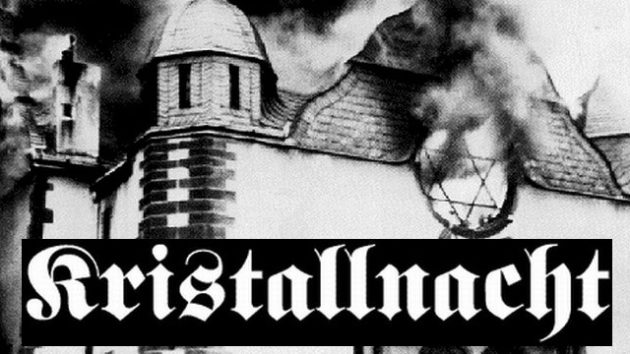Remembering the Horrors of Kristallnacht – Lest we as human beings ever forget
This week marks a cruel yet hopeful anniversary. On November 9-10, 1938, a two-day period now known as Kristallnacht, Nazis plundered Jewish homes, schools and businesses across Germany. My grandfather, only 14 at the time, recalled seeing Jewish stores looted, books burned, and signs saying “kill the Jews.” Two days later, he received a letter from his family saying that his father, my great-grandfather, had been taken to Dachau, which we now know was the equivalent of a death sentence.
It has never been easy to come to grips with my family history. My aunt recently completed a family tree going back centuries; many of its branches end abruptly in the late 1930s and early 1940s. These names, no more than entries on a piece of paper to me, represent my heritage, my family—much of it lost in the hollow corridors of concentration camps. I can only imagine how my life would have been different had my grandparents, aunts, uncles and cousins never experienced the merciless brutality of the Holocaust.
My grandparents shared bits and pieces of their experiences with me as I grew up, careful to say only as much as they thought I could handle. One day, while riding around on my grandfather’s lap in his electric wheelchair, I asked him, “What is that number on your arm?” Transforming a physical characteristic designed to make him less human into a source of feigned pride, he told me it was a number that made him unique because he was the only person in the world who had it. Only later, as I approached my teenage years, did my grandfather tell me that a fellow prisoner tattooed the number—117022—on his left forearm when he arrived at Auschwitz.
Four years ago, on the 75th anniversary of Kristallnacht, I spoke publicly about my grandparents’ experience for the first time. Standing in the rotunda of the Minnesota Capitol, I read my grandfather’s account of being transported on a freight car to Auschwitz, stripped of civilian clothes upon arrival, and forced to run naked through a cold April rain.
My grandfather had the uncommon gift of being able to see the light of human generosity in the midst of near-total darkness. He recounted his experience at the camp hospital, sick and malnourished: German nurses reported to their superiors that they had discharged my grandfather when they in fact transferred him to another room until he was able to recover. Their kindness, he said—which they undertook at great risk to their own lives—saved him from the gas chamber.
My grandfather again saw the best and worst in humanity after he agreed to participate in an escape plot. The guards captured three co-conspirators, who were hanged in the middle of the camp as a prisoner orchestra played German songs to accompany the spectacle. The men took the secret of my grandfather’s involvement to their graves.
Only after years researching their stories and reflecting on their lives do I understand the message my grandparents had tried to impart—one of hope and gratitude, not bitterness or pity. As my grandfather said in a memorial service speech in 1979, we remember those who “lost their lives while fighting for their freedom, the freedom of us and the freedom of mankind.” He emphasized that “we, the survivors, have to let the world know that we will never again allow another Holocaust” and told the audience that “you, and you alone, have the responsibility to speak up for our fallen relatives and friends.”
My grandparents always said they were the lucky ones, and that they were left on earth to speak for those who had perished. Their guidepost was humanity, not indulgence in their own sorrow and suffering.
They spoke for their friends and family members who were not “lucky” enough to make it, and to ensure that the stories of those who perished did not become footnotes in a dusty history book in the library. Theirs was a message of optimism, intended to ensure that their children and grandchildren were able to lead a life free from the atrocities that they had witnessed. I get it now, grandma and grandpa, and I hope the world gets it now too.
Justice Stras serves on the Minnesota Supreme Court and is a nominee for the Eighth U.S. Circuit Court of Appeals.




Leave a Reply
Want to join the discussion?Feel free to contribute!